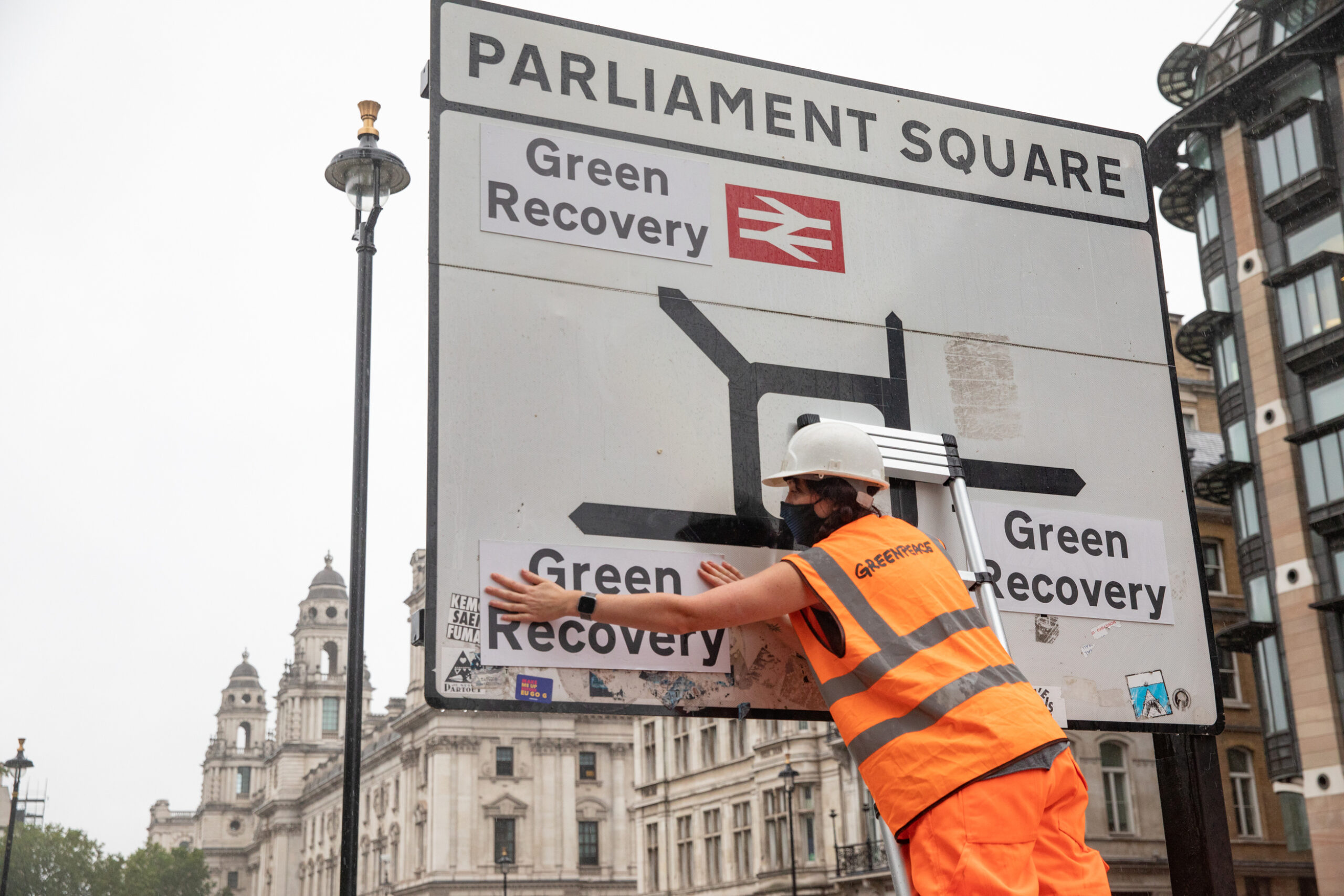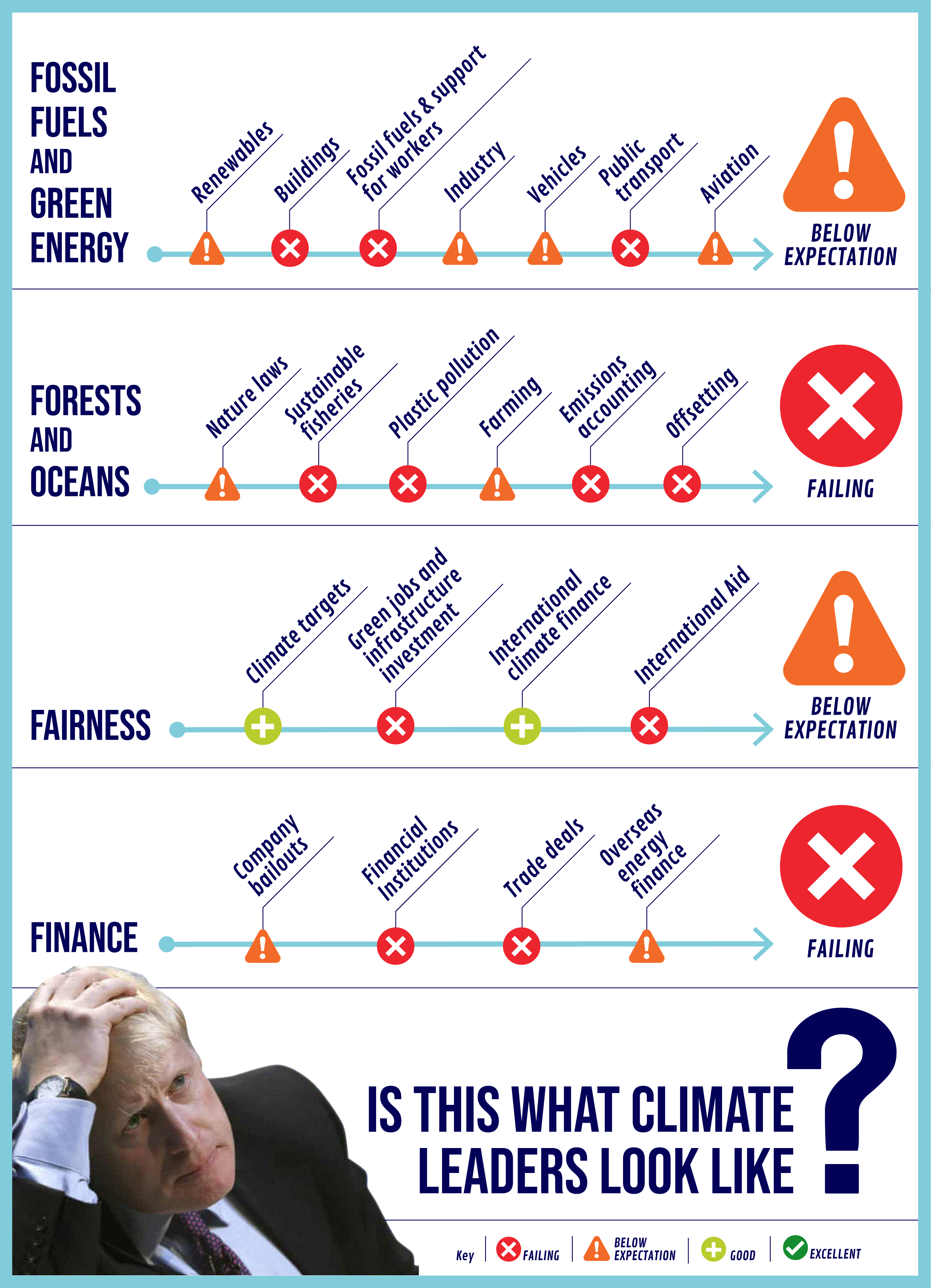
The UK might be a small country, but as the birthplace of the industrial revolution, we’ve always played an outsized role in the story of climate change. This year the UK is playing a bigger part than ever, as we’re hosting the COP26 global climate talks in Glasgow.
The government says it wants all countries to raise their carbon cutting ambition. But those words won’t carry much weight unless we’ve got our own house in order. So Greenpeace has checked how the government’s climate programme measures up, and how they can do better.
Boris Johnson’s climate change scorecard
This scorecard rates the domestic and international action promised or taken by the government, in four areas:
- Fossil fuels and green energy: tackling climate change means breaking our reliance on fossil fuels. How’s the UK’s transition to green energy going?
- Forests and oceans: healthy habitats absorb huge amounts of carbon.We must protect them and not allow polluters to use them as greenwash.
- Fairness: a greener world should work for everyone. And we need to be supporting those on the frontline of the climate crisis. Is the UK doing enough to make that happen?
- Finance: is the government putting its money where its mouth is, or are UK banks and financial institutions pouring cash into high-polluting industries?
In each of the four areas, we’ve looked at what kinds of promises the government made; what they’ve actually done and if there’s been any delays; and what they need to do this year before the UK can call itself a climate leader.
Each of these things is key to tackling the climate crisis, so by looking at them we can cut through the rhetoric and rate the UK’s real progress. Sadly, the verdict isn’t good:

Looking for more detail? Here’s a full breakdown that explains the final scores.
How the UK can do better on climate change
Boris Johnson’s scorecard shows how badly the UK is falling short on climate change – despite the government saying over and over again how good they are.
But this isn’t about bashing the government for the sake of it. It’s about showing where they can do better on something that both politicians and the public think should be a priority.
Given we are still in a pandemic, it can be tempting to let the government off the hook for not being up to speed on climate. But climate change is a crisis that will dwarf coronavirus – with unimaginable effects for everyone on Earth – especially if strong and decisive action isn’t taken now.
So while the government currently talks a good talk about climate action, we need them to start walking the walk. So what would a high-scoring climate programme look like for the UK?
For starters, it’d mean:
- Committing to end new oil and gas licenses.
- Coming up with real plans and investment in green homes, green jobs, green energy, green transport and for a smooth, fair transition away from fossil fuels.
- Regulating the banks and financial institutions so they can’t fund climate wrecking industries.
- Introduce a legally-binding target to begin to reverse the decline of UK nature by 2030.
- Increase financial support for climate action abroad, to support communities on the front line of the crisis.
Climate change is already impacting millions of lives, including in the UK. But the incredible scientific success of the vaccine shows that the UK can lead the world in innovation, even in a crisis. We have the solutions. Now the governments of the world must implement them.
Coronavirus has knocked many plans off course. But the government is claiming to be a world leader on climate change, and we should hold them to their word.
Why climate action in the UK matters now, more than ever
This year, the UK is hosting a crucial round of international climate negotiations known as COP26.
In November, world leaders and top government officials from every country will gather in Glasgow to agree the world’s next steps on climate action. This year’s talks are particularly important, because countries are due to present their ‘Nationally Determined Contributions’ – essentially outlining the part they’ll play in the global fight against climate change.
Hosting these talks is a huge responsibility, and it gives the UK much more influence on other countries’ climate commitments than it’d ever have normally. That means for the next few months, climate action here can help unlock climate action everywhere.
